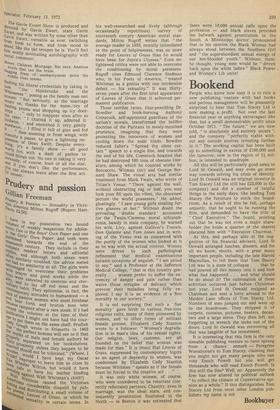P rudery and passion
Qillian Freeman
ZPrnLiderY kPassion Sexuality in Victo "11.As rnerica Milton Rugoff (Rupert Hartin my possession two bound weekly magazines for adoles 's -ents, n ‘-'ne is the Boys' Own Paper and one 1:?blisthe Girls' Own Paper, and both were hed towards the end of the cruneteenth century. They include in their re'ntents readers' letters and editorial Gefilplies, and although both sexes were u oi,t+-1,1, sitdilarly troubled, the advice meted e-ad cl no similarity at all. The girls were wn.erhutaged to overcome their problems boll,Prayer and good works while the airv's Were exhorted to exercise and chiysor,i! and to lay off red meat and the eoll'i.`arY habit. They epitomise, in fact, the a rae`elnPorary attitudes to humankind — r ande elf passive women who must forebear be bear forth and brutish men who _ own'Ille rarnPant after a rare steak. If I had pelt3lie,d the volumes at the time of their age fleation I might not have had the courLa:' Put them on the same shelf. Prudish that", Gough wrote in Etiquette in 1863 the , the perfect hostess will see to it that h Propp"r°,rits of male and female authors e The-i,-.-Y separated on her bookshelves. Illair.., Proximity Unless they happen to be wondied should not be tolerated." (Where, Wiltie,,e,r'., WoUld I have kept my Oscar Ella -Ax,' L'InProper to leave him so close to beer, -"eeler Wilcox, but would it have Pressi,safe to have his leather binding \,\Tg against Walt Whitman's cloth?) Whitman caused the Victorian lishiri-cans considerable disquiet by pubCaleb and distributing small volume of 1ns, Leaves of Grass, -Grass, in which he his well-researched and lively (although occasionally repetitious) survey of nineteenth century American moral standards, Milton Rugoff writes that " the average reader in 1855, morally intimidated to the point of helplessness, was no more ready for Leaves of Grass than he would have been for Joyce's Ulysses," Even enlightened critics were not able to overcome the conditioning by moral pressures. Rugoff cites Edmund Clarence Stedman who, in his Poets of America, "treated Whitman as a genius with one intolerable defect — his sexuality," It was thirtyseven years after the first brief appearance of Leaves of Grass that it achieved permanent publication.
Those terrible twins, blue-pencilling Dr. Bowdler and book-burning Anthony Comstock, self-appointed guardians of the nation's morals, transformed the hellfire doctrine of the Puritans to mealy-mouthed prurience, imagining that they were protecting the innocence of women and cooling down the male libido. Bowdler reduced Juliet's " Spread thy close curtain" speech to a single line, and towards the end of his life, Comstock boasted that he had destroyed 160 tons of obscene literature, among which he counted works by Boccaccio, Witman (sic) and George Bernard Shaw. The visual arts had similar treatment from Mark Twain, who wrote of Titian's Venus: " There, against the wall, without obstructing rag or leaf, you may look your fill upon the vilest, the obscenest picture the world possesses." He added, gloatingly, "I saw young girls stealing furtive glances at her." Without doubt the prevailing 'double standard' accounted for the Twain/Clemens moral schizophrenia; bawdy in male company, he warned his wife, Livy, against Gulliver's Travels, Don Quixote and Tom Jones and in writing of the Venus was as concerned with the purity of the women who looked at it as he was with the actual content. Women were driven to such pathological refinement that medical examinations became occasions of anguish. "I am proud to say," said a Professor at the Jefferson Medical College, "that in this country generally . . . women prefer to suffer the extremity of danger and pain rather than waive those scruples of delicacy which prevent their maladies being fully explored. I say it is an evidence of a fine morality in our society."
It is not surprising that such a ' fine morality' gave birth to various free-love religious cults, many of them pioneered by women, and to other forms of militant female protest. Elizabeth Cady Stanton wrote to a follower: "Women's degradation is in man's idea of his sexual rights. Our religion, laws, customs, are all founded on the belief that woman was made for man." It is ironic that Leaves of Grass, suppressed by contemporary bigots as an agent of depravity in women, was condemned by Elizabeth Cady Stanton because Whitman " speaks as if the female must be forced to the creative act . . ."
It was only white women, of course, who were considered to be reluctant (correctly reluctant) partners. Chastity, even in marriage, was the ideal state, and consequently prostitution flourished in the North — in Boston it was estimated that there were 10,000 annual calls upon the profession — and black slaves provided the bulwark against prostitution in the South. A Mississippi doctor pronounced that in his opinion the Black Woman had always stood between the Southern Girl and "the superabundant sexual energy of our hot-blooded youth." Without them, he thought, young men would be "driven back upon the white ladies." Black Power and Women's Lib unite!










































 Previous page
Previous page